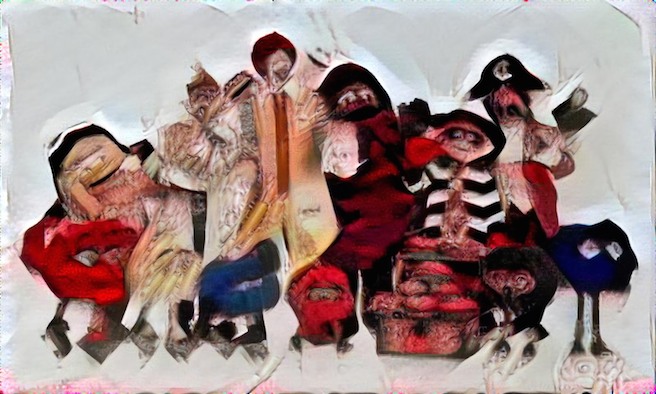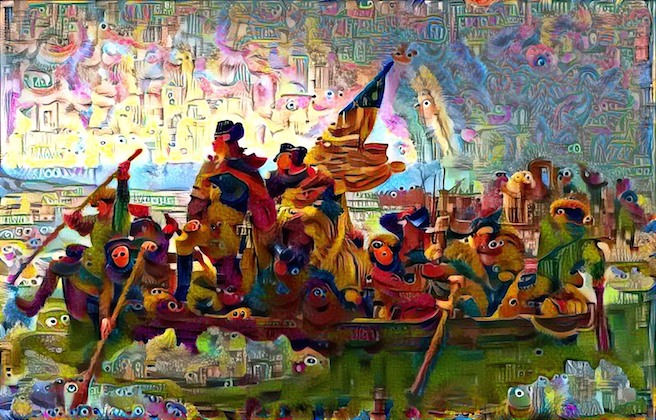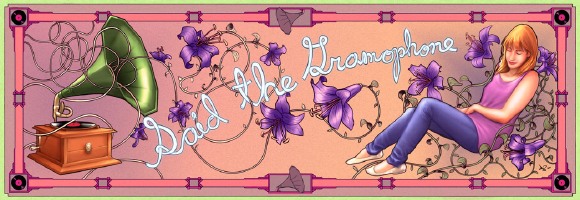
Les Amis au Pakistan - "M'a m'f". You do not need to put up with this shit. You've got a hammer for the window, a clutch full of doorknobs, spinach by the can. Volkswagens, squirt-bottles, rocket-launchers, indignation sky-written in the cloud. I•N•D•I•G•N•A•T•I•O•N. You've considered letting that stand alone; perhaps the letters are message enough. But: no. Not when you can make their phones go off like pepper bombs, not when you can yank away the cartoonery of their cover. You do not need to put up with this shit, nor shall you. The Ming vase will crash upon the floor and the lightning-bolt will come away in your hands, an elemental thing claimed by its rightful heir.
[Les Amis au Pakistan bandcamp / discovered on La Souterraine's O Canada compilation]
10:29 AM on Aug 15, 2016.
Beverly - "Crooked Cop". It was probably not the best year to release a jangly love song called "Crooked Cop". The song's central metaphor hadn't bothered me until I sat down to write about it; until that moment its red and blue lights just cruised on past. It's been on for months, casting starbursts round my rooms, bittersweet as a teenage mixtape. Yet if Beverly were led by a man, I'd probably be saying that I'd heard this kinda thing before. Glittering guitars, handclaps, reverb - we know all this, right? We already have a (teenage) fanclub for it. But it's Drew Citron's singing that changes the foreground of the music, linking it across time and space to something as far-away as Sandy Denny. (In this she reminds me of Alvvays' Molly Rankin.) The singing is something else - at the front and in harmony - like the song's feelings are fraying and a moment later, in nostalgic retrospect, getting woven back together.
[buy]
Smerz - "Because". Smerz are two women, producers Henriette Motzfeldt and Catharina Stoltenberg. This song seems founded on the unsaying of something, the unsaying or unsinging. The same line repeated, sampled, cut up and clipped. "Because we said the same thing so many times." That line, uttered by either Henriette or Catharina. "Because we said the same thing so many times," said, unsaid, repeated. Eventually she explains the "thing" that was said so many times. It was this: "I was thinking of leaving."
Perhaps this is a song about a break-up. Perhaps the shame is that doubt was said and said and said; that it was going on all the time. Not just thought, once; said, "so many times." In lightninged nights and safer ones.
But perhaps this is a song about something else. Those nauseous synths pour folds into the song, places where the fabric of it seems to slip. It slips and there's an ugliness underneath. A violence, maybe. Smerz's singers do not try to unsing the thought that they should leave. What they try to unsing, deny, is that they said it, out loud, "so many times". They said it so many times; they knew it; they knew they should go. And perhaps they didn't.
[soundcloud]

Agnes Obel - "Familiar". "Love is a danger," Obel sings, and here she seems to be singing the contours of that trap - its rough sections and mirrored ones, the way you can be lured by a reflection. There is nothing more sinister than an almost, a not-quite; here she hides the uncanny behind walls of glossy strings, columns of harp; here she hides it behind another Agnes's face. The cello's a compass-needle pointing back toward safety, back toward home. Don't gaze too long into the chasm. Don't gaze too long into the other Agnes's eyes.
[official website / european tour this fall]

Snow Roller - "Too Good".
Snow Roller - "Kar Kar Binks".
Sometimes Snow Roller's guitars are ding-dong doorbell, sometimes ding-dong cake or ding-dong mixed nuts. Sometimes their guitars are ding-dong the witch is dead. Imagine an electrified doorbell, joy-buzzer style. An electrified valentine. A young man in love with a mile of electric fence. It's an undangerous danger, like certain kinds of crushes or drunkennesses. The way a guitar part can feel utterly new, just-written, while also nostalgic - awash in dreams of Weezer's Blue Album or even Jimmy Eat World's Clarity, as if it's a cover run too-many-times through Google Translate. These songs are tiny clubhouses, Ronald McDonald cabooses (cabeese?) full of friends. They are first dates, last dates, mixtapes written but never delivered. Did I mention those guitar sounds? I want to go sledding in summer - somehow for there to be sledding in summer, in flying snow, arcing jumps, ice and frost and all the summer blaze, beer or sangria and cats shimmering in the heat, the tin drumming of downpour rain, and all that wind. (thanks Hamza)
[bandcamp]
The following is a guestpost written by my friend Julia Caron, one of Said the Gramophone's longest readers, whom I finally met in Québec City last year. All of us at StG would like to send our love to Geneviève Elverum, whose work we have revered for more than a decade.
Ô Paon - "Sainte Patronne de Rien Pantoute".
On Tuesday night, I stayed up late re-reading Geneviève Elverum's Maman Sauvage. I had first read it this winter, after discovering I was unexpectedly pregnant. I was desperately thirsting for words and experiences I could relate to. Where could I find stories of a woman like myself: an adult who often feels ill-equipped to deal with the responsibilities of adulthood, let alone pregnancy. Were there other women out there, pregnant and overwhelmed by the strange and surreal process of carrying a baby in one's body? I had read one patronizing pregnancy "how-to" book too many, and I finally found solace in these poems by Geneviève. I shouldn't have been shocked to find that her poems resonated with me just as deeply as her music had, but I was.
Page after page, I found slivers of myself in her words, in her stories, just as I had in her songs, years prior. Her musical projects, Woelv and Ô Paon, came into my life via a tweet from her partner Phil Elverum in 2014. How has no one told me about her sooner? I thought to myself. I listened slack-jawed, overwhelmed by these songs. Who was this bilingual Québécois woman with droning sounds and unnerving lyrics about the city I live in, and even its south shore which I know so well? Who was this woman who sings of these places in a language that feels like my second skin, avec des notes qui faussent in the most wonderful dissonant way.
It happens, that strange intimacy. The desire to call a stranger by her first name because you have heard her songs, read her books, admired her art. The distorted impression that you might even know this stranger better than you know certain friends - because the stranger has laid their heart bare and shared it with you. Hearing songs that tell you no, you're not the only one who feels that way.
The next morning, I learned of Geneviève's illness. It is heartbreaking to hear of anyone diagnosed with inoperable, stage 4 cancer, let alone if they are a new parent. A new parent who happens to make gorgeous art, but art that doesn't pay the bills in the same way other work can. And it feels yet more visceral, violent, tragic to discover this diagnosis about someone who has sung songs that got you through the shittiest winter days, someone who writes words you feel you could have written yourself.
I read Geneviève's news on a tiny screen in a public place. Tears welled up as I continued past the first few words, absorbing the facts. Geneviève Elverum. 34. New mother. Inoperable. Written by her partner Phil, their plea for financial help alludes to the way they have long kept their private life private, and how "the difficult times ... challenge that bubble." Perhaps these donations from strangers will help protect the beautiful bubble they've chosen to create for themselves and for their family, and will help them continue their dispatches toward our eyes and ears.
I've been thinking about Geneviève and her family as I wander through Québec City, a place she once called home. On her spectacular album Fleuve, she sings about this city caked in ice and dirt and melancholy. These days, it is anything but: it is green and warm and the lilacs are blossoming yet my heart feels heavy with her words and songs in my head. I find myself walking past those lilac bushes, praying to the Sainte Patronne de Rien Pantoute, the Patron Saint of Nothing at All, wishing for the best for this stranger who somehow doesn't seem a stranger.
Love to Geneviève, Phil, Agathe and their cat Manon.
---
> Donate to help Geneviève Elverum and her family.
> Learn more about Geneviève's work.
> Buy Courses, from which this song is taken.
Julia Caron is a bilingual bundle of contradictions, endlessly enamoured by self-portraits, dip-and-dunk photobooths and confrontational contemporary art. She has called Quebec City home since 2008; it is only appropriate she ended up in one of the oldest cities in North America, given her affection for all things old.

Kate Maki - "Before It Began". There is the kind of day, the kind of love, that call for just the simplest songs. A hot day, a deep love. These do not require complexity, riddles, worriment, they need no knots. A sentiment in sharpened pencil - that silver dust. A piano like a still life, in changing light. Pay attention: this is not that song. It may appear that way. It appears that way for fully half its length. But the weather changes; the love lifts somewhere else. The sweetest two minutes you may hear today is in fact bittersweet. Remember: even the prettiest things blow over.
Maki reminds me a little, here, of a chaster John Prine and Iris Dement. This is saying something. I hope you'll buy Head in the Sand.
|
about said the gramophone
This is a daily sampler of really good songs. All tracks are posted out of love. Please go out and buy the records.
To hear a song in your browser, click the  and it will begin playing. All songs are also available to download: just right-click the link and choose 'Save as...'
All songs are removed within a few weeks of posting.
Said the Gramophone launched in March 2003, and added songs in November of that year. It was one of the world's first mp3blogs.
If you would like to say hello, find out our mailing addresses or invite us to shows, please get in touch:
Montreal, Canada: Sean
Toronto, Canada: Emma
Montreal, Canada: Jeff
Montreal, Canada: Mitz
Please don't send us emails with tons of huge attachments; if emailing a bunch of mp3s etc, send us a link to download them. We are not interested in streaming widgets like soundcloud: Said the Gramophone posts are always accompanied by MP3s.
If you are the copyright holder of any song posted here, please contact us if you would like the song taken down early. Please do not direct link to any of these tracks. Please love and wonder.
"And I shall watch the ferry-boats / and they'll get high on a bluer ocean / against tomorrow's sky / and I will never grow so old again."
about the authors
Sean Michaels is the founder of Said the Gramophone. He is a writer, critic and author of the theremin novel Us Conductors. Follow him on Twitter or reach him by email here. Click here to browse his posts.
Emma Healey writes poems and essays in Toronto. She joined Said the Gramophone in 2015. This is her website and email her here.
Jeff Miller is a Montreal-based writer and zinemaker. He is the author of Ghost Pine: All Stories True and a bunch of other stories. He joined Said the Gramophone in 2015. Say hello on Twitter or email.
Mitz Takahashi is originally from Osaka, Japan who now lives and works as a furniture designer/maker in Montreal. English is not his first language so please forgive his glamour grammar mistakes. He is trying. He joined Said the Gramophone in 2015. Reach him by email here.
Site design and header typography by Neale McDavitt-Van Fleet. The header graphic is randomized: this one is by Danny Zabbal.
PAST AUTHORS
Dan Beirne wrote regularly for Said the Gramophone from August 2004 to December 2014. He is an actor and writer living in Toronto. Any claim he makes about his life on here is probably untrue. Click here to browse his posts. Email him here.
Jordan Himelfarb wrote for Said the Gramophone from November 2004 to March 2012. He lives in Toronto. He is an opinion editor at the Toronto Star. Click here to browse his posts. Email him here.
our patrons
search
Archives
elsewhere
our favourite blogs
(◊ means they write about music)
Back to the World
La Blogothèque ◊
Weird Canada ◊
Destination: Out ◊
Endless Banquet
A Grammar (Nitsuh Abebe) ◊
Ill Doctrine ◊
A London Salmagundi
Dau.pe ◊
Words and Music ◊
Petites planètes ◊
Gorilla vs Bear ◊
Herohill ◊
Silent Shout ◊
Clouds of Evil ◊
The Dolby Apposition ◊
Awesome Tapes from Africa ◊
Molars ◊
Daytrotter ◊
Matana Roberts ◊
Pitchfork Reviews Reviews ◊
i like you [podcast]
Musicophilia ◊
Anagramatron
Nicola Meighan ◊
Fluxblog ◊
radiolab [podcast]
CKUT Music ◊
plethoric pundrigrions
Wattled Smoky Honeyeater ◊
The Clear-Minded Creative
Torture Garden ◊
LPWTF? ◊
Passion of the Weiss ◊
Juan and Only ◊
Horses Think
White Hotel
Then Play Long (Marcello Carlin) ◊
Uno Moralez
Coming Up For Air (Matt Forsythe)
ftrain
my love for you is a stampede of horses
It's Nice That
Marathonpacks ◊
Song, by Toad ◊
In FocusAMASS BLOG
Inventory
Waxy
WTF [podcast]
Masalacism ◊
The Rest is Noise (Alex Ross) ◊
Goldkicks ◊
My Daguerreotype Boyfriend
The Hood Internet ◊
things we like in Montreal
eat:
st-viateur bagel
café olimpico
Euro-Deli Batory
le pick up
lawrence
kem coba
le couteau
au pied de cochon
mamie clafoutis
tourtière australienne
chez boris
ripples
alati caserta
vices & versa
+ paltoquet, cocoa locale, idée fixe, patati patata, the sparrow, pho tay ho, qin hua dumplings, café italia, hung phat banh mi, caffé san simeon, meu-meu, pho lien, romodos, patisserie guillaume, patisserie rhubarbe, kazu, lallouz, maison du nord, cuisine szechuan &c
shop:
phonopolis
drawn + quarterly
+ bottines &c
shows:
casa + sala + the hotel
blue skies turn black
montreal improv theatre
passovah productions
le cagibi
cinema du parc
pop pmontreal
yoga teacher Thea Metcalfe
(maga)zines
Cult Montreal
The Believer
The Morning News
McSweeney's
State
The Skinny
community
ILX
|









This is terrific! What is she saying??